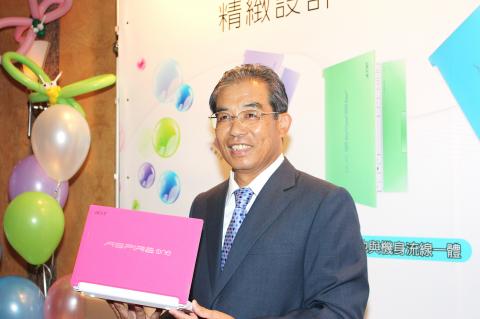Despite a rising threat from tablet PCs, netbooks are here to stay, said Scott Lin (林顯郎), president of Acer Inc’s (宏碁) Taiwan operations, yesterday.
“When netbooks were launched in 2007, I was asked the same question about whether they would replace traditional notebooks,” Lin told reporters yesterday. “Notebooks still exist today.”
He said “brand new star products” — such as the Eee PC introduced in 2007 by Asustek Computer Inc (華碩電腦) and the iPad from Apple Inc — would grab the public’s attention who would develop a fondness for them.

PHOTO: CHUO I-CHUN, TAIPEI TIMES
Competition will increase, but tablets won’t be able to eat away at the whole netbook pie, he said.
Citing statistics from Gartner Inc, Lin said worldwide netbook shipments this year would post 9 percent growth from last year to 35.6 million units and that number will approach 50 million in 2014.
Acer, the world’s second--largest PC brand, is the largest netbook brand and will ship about 10 million netbooks worldwide this year, he said.
However, Lin kept mum on the launch date for the company’s -tablet PC, only saying the company would launch products that will “wow the market with a strong selling point.”
Supply chain sources have said Acer is set to test the waters in Europe and the US by rolling out its first tablet model, which runs on a Windows operating system, this month.
The company yesterday -unveiled the industry’s first slew of netbooks with dual-core processors. The new “Happy” Aspire One netbooks feature dual operating systems — Android and Windows 7 Starter — and have a built-in 250GB hard drive, a specification that exceeds the maximum 160GB offered by the earlier generation.
The price tag is NT$13,800 (US$431) and they will be available in Taiwan this month.

Taiwan will prioritize the development of silicon photonics by taking advantage of its strength in the semiconductor industry to build another shield to protect the local economy, National Development Council (NDC) Minister Paul Liu (劉鏡清) said yesterday. Speaking at a meeting of the legislature’s Economics Committee, Liu said Taiwan already has the artificial intelligence (AI) industry as a shield, after the semiconductor industry, to safeguard the country, and is looking at new unique fields to build more economic shields. While Taiwan will further strengthen its existing shields, over the longer term, the country is determined to focus on such potential segments as

UNCERTAINTY: Innolux activated a stringent supply chain management mechanism, as it did during the COVID-19 pandemic, to ensure optimal inventory levels for customers Flat-panel display makers AUO Corp (友達) and Innolux Corp (群創) yesterday said that about 12 to 20 percent of their display business is at risk of potential US tariffs and that they would relocate production or shipment destinations to mitigate the levies’ effects. US tariffs would have a direct impact of US$200 million on AUO’s revenue, company chairman Paul Peng (彭雙浪) told reporters on the sidelines of the Touch Taiwan trade show in Taipei yesterday. That would make up about 12 percent of the company’s overall revenue. To cope with the tariff uncertainty, AUO plans to allocate its production to manufacturing facilities in

COLLABORATION: Given Taiwan’s key position in global supply chains, the US firm is discussing strategies with local partners and clients to deal with global uncertainties Advanced Micro Devices Inc (AMD) yesterday said it is meeting with local ecosystem partners, including Taiwan Semiconductor Manufacturing Co (TSMC, 台積電), to discuss strategies, including long-term manufacturing, to navigate uncertainties such as US tariffs, as Taiwan occupies an important position in global supply chains. AMD chief executive officer Lisa Su (蘇姿丰) told reporters that Taiwan is an important part of the chip designer’s ecosystem and she is discussing with partners and customers in Taiwan to forge strong collaborations on different areas during this critical period. AMD has just become the first artificial-intelligence (AI) server chip customer of TSMC to utilize its advanced

Chizuko Kimura has become the first female sushi chef in the world to win a Michelin star, fulfilling a promise she made to her dying husband to continue his legacy. The 54-year-old Japanese chef regained the Michelin star her late husband, Shunei Kimura, won three years ago for their Sushi Shunei restaurant in Paris. For Shunei Kimura, the star was a dream come true. However, the joy was short-lived. He died from cancer just three months later in June 2022. He was 65. The following year, the restaurant in the heart of Montmartre lost its star rating. Chizuko Kimura insisted that the new star is still down